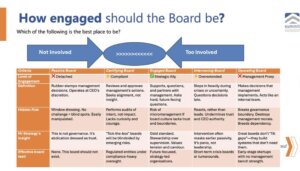A great board is like an expert football coach.
They do not rush onto the pitch and don’t take the penalty kicks. But they watch the game closely, read every move, adjust the strategy when needed, and hold each player accountable. They do not interfere, but their influence is unmistakable.

Weak boards? They fall into two extremes. Some cheer blindly, clapping at every decision without question. Others storm the field when the game is already lost, trying to do in panic what they failed to guide in peace.
Over the years, I’ve seen boards of all shapes, some passive, some noisy, some overbearing. But only one kind consistently drives results: the strategic board.
What makes a great Board?
Passive boards exist solely to meet requirements. They meet because they have to, not because they want to make a difference. Cheerleader boards, on the other hand, support management no matter what. Their loyalty, though admirable, often blinds them to red flags.
Then there are the micromanagers. These boards think they’re helping by diving into operations, but in reality, they choke innovation and disempower leadership. Crisis boards are silent until disaster strikes. Then suddenly, they are everywhere, reacting instead of leading.
And finally, the great ones, the strategic boards. These are the boards that understand their true role: to govern, not to manage. They think long-term, challenge constructively, and ask the right questions.
They hold management accountable without interfering. And above all, they stay focused on the bigger picture, purpose, sustainability, performance, and risk.
Ask yourself the hard question:
If your board were to disappear for six months, would anyone notice?
A great board sets direction, not tasks. It protects values, not egos. It ensures the organisation is always one step ahead of change, not one step behind disaster.
Boards are not meant to rubber-stamp decisions, nor are they meant to run the business. They exist to steward the mission, to guide with wisdom, and to govern with courage.
If your board already does that, well done, you are ahead of the curve.
If not, it’s never too late to transform the sidelines into a strategic advantage.
I remain, Mr. Strategy







